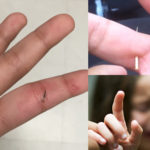How to Stay Safe in Emergency Situations
If you’ve never had a swimming instructor and are unfamiliar with survival tips, don’t overlook the courses arranged by lifeguards on beaches. It would be a good idea to join these courses with your family or friends. According to experts, people remember more when they are taught information in a fun way, rather than reading a lengthy document on the subject.
You will learn how to behave in emergency situations. For example, if a rip current pulls you and your child out to sea, lifeguards advise against constantly lifting the baby as it will exhaust both of you within 20-30 seconds. Instead, they will recommend that you lay the child on their back, support their neck, and swim slowly until help arrives. This method will help conserve your energy.
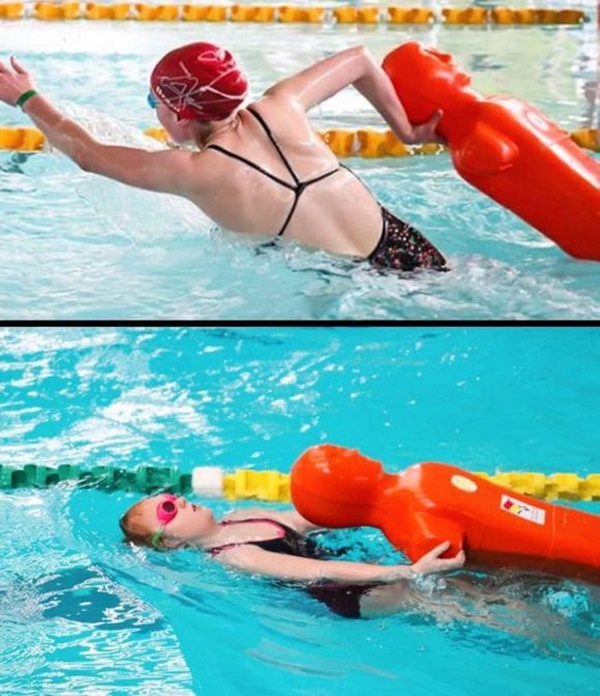
Useful experience for those who like swimming.
How to Reduce the Risk of Infection After Swimming
When swimming, it is safer not to swallow pool or seawater as it may contain pathogens, especially rotaviruses that cause diarrhea. Symptoms of infection usually appear after 2-3 days and include vomiting, gastrointestinal disorders, fever, and sore throat.
Do not wash fruits and vegetables in seawater as there is a high risk of E. coli or enterovirus infection. If you are vacationing with a baby, do not let them play on the surf as the water is the most polluted there. Try to distract the baby by directing them to build sandcastles.
Doctors say that the concentration of pathogens for serious infections in swimming pools is quite small, as bacteria quickly die when exposed to chlorine. However, it is still important to take precautions.
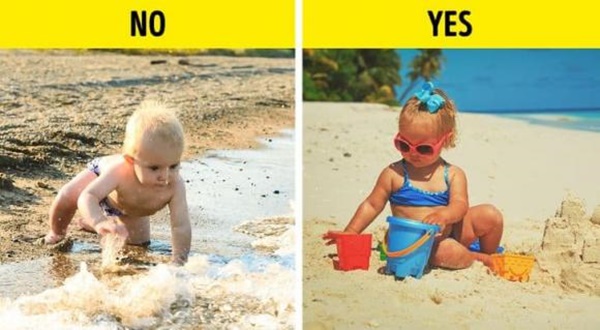
What Happens When You Jump Into Cold Water in Hot Weather
Some people think that jumping into cold water in hot weather contributes to better disease resistance. But in reality, although cold water stimulates the production of immune cells (T-lymphocytes), this is only true for those who actually swim a lot. For others, the drastic temperature change can cause severe stress on the body and put pressure on the cardiovascular system.
To avoid respiratory disorders, exacerbating chronic illnesses, and seizures, try to avoid jumping into cold water immediately. This is extremely dangerous if done at the hottest time of the day, especially after being in the sun for a long period. Instead, enter the water gradually, splashing it on your body, and allowing your body to adjust to the temperature. After that, jumping into the water will no longer be dangerous.
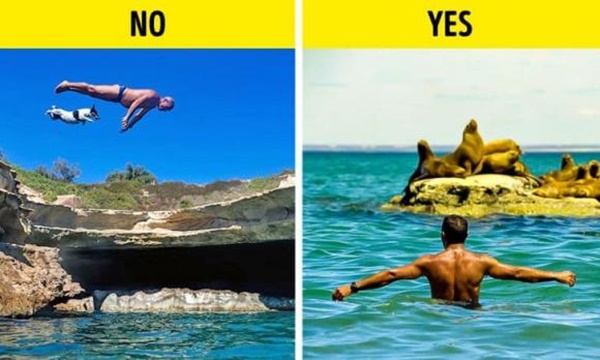
Which Marine Creatures are Dangerous and Which are Not?
Many people panic at the sight of sea dragons or sea urchins. Their stings are very painful but fortunately, they are not deadly.
You should know that there are marine creatures that look attractive but are very dangerous. For example, the toxin in the box jellyfish’s tentacles can kill 60 people in 3 minutes, while the cone-shaped shells that people often bring home as souvenirs from the ocean are the former ‘homes’ of venomous cone snails. The danger arises when people try to hold a live shell in their hand – its toxin, called conotoxin, can cause paralysis and heart failure.
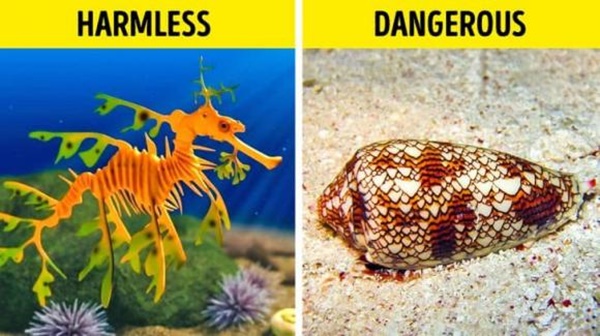
What Risks Do We Face When Visiting a Beach with a ‘No Swimming’ Sign?
People often ignore “No Swimming” and “No Diving” signs when they are at a sunny beach. So, what do these signs mean?
– If this sign is near a river or lake, there is a high likelihood of dangerous creatures that can cause intestinal, ear, and eye infections, or parasites in the water.
– If it is at the seaside, this sign is usually placed in an area with rip currents – currents that can pull someone out to sea – and people should stay away. If you’ve entered the danger zone, don’t swim towards the shore, but rather swim parallel to the current. This will help you escape the rip current as it will push you out, and eventually, you will be able to return to shore. The most important thing is never to ignore a “No Diving” sign as the bottom of these areas may be full of invisible rocks, iron bars, and submerged objects.
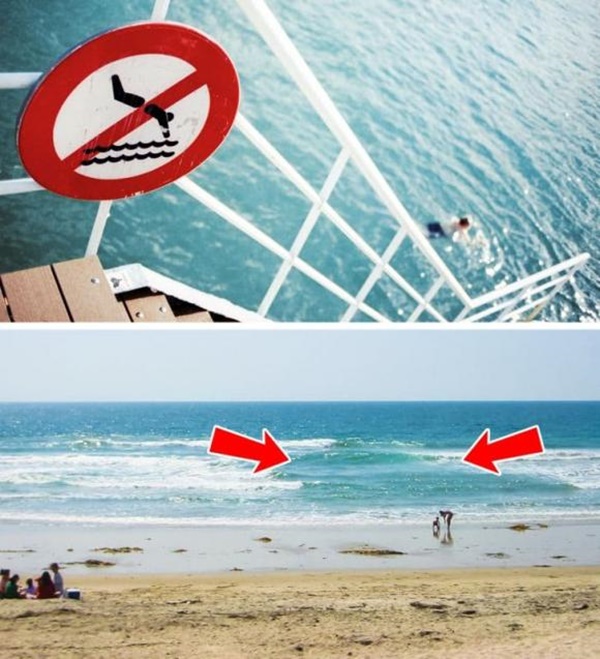
Avoiding the Harmful Effects of Salt and Chlorine
To keep your skin healthy when swimming in the ocean, remember to shower afterward. This will help remove salt and toxins from your skin. After showering, dry your skin and apply moisturizer.
Swimming pools, on the other hand, often contain chlorine – a chemical that can cause eye irritation, skin aging, and hair damage. If you’re swimming in a pool, your best option is to choose a well-chlorinated pool. Wearing a cap and tight goggles can also protect you in a regular pool.
Another thing to remember is always to remove your makeup before swimming as chlorine and cosmetics can cause allergic reactions. Additionally, apply coconut oil or body lotion all over your body. After swimming, shower with soap and water, dry your body with a clean towel, and moisturize. If you’re swimming in an indoor pool, don’t go outside right afterward, especially in cold weather – wait for 20-30 minutes to allow the moisture to evaporate from your skin and for your body to adjust to the temperature.
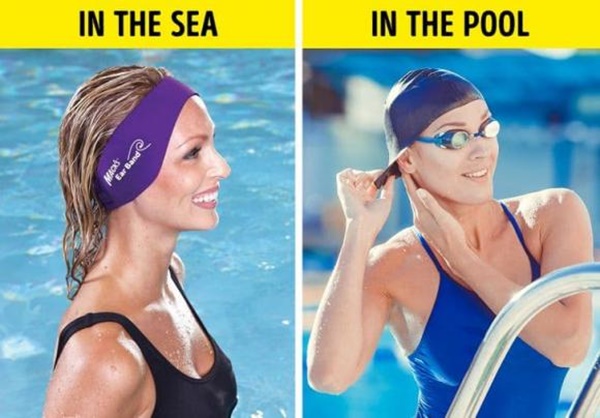
Where is it Better to Learn to Swim: at the Beach or in a Pool?
Many people learn to swim naturally when they go to a river or the sea. You can try to see if the water is calm and clear, if your companions are strong swimmers, and remember to wear a life jacket. Parents often teach their children by standing opposite them and having them swim short distances.
Although floating in the sea will be much easier, learning to swim is often interrupted by glare, waves, currents, and sometimes countless sea creatures. Experts advise taking a beginner’s course in a pool with an instructor. Many people learn a lot from their first lessons and gain important skills that they will use for a lifetime.

How to Avoid Swimmer’s Ear
Our ears are naturally well-protected from water due to their shape. It doesn’t allow water to enter and stagnate. The sulfur in earwax maintains the pH and acid balance in the ear, helping to kill harmful bacteria and fungi. But when swimming, earwax tends to be pushed out, and the ears become vulnerable. Prolonged exposure to water and the contaminants it may contain can lead to external and middle ear infections.
Doctors recommend drying your ears with the corner of a tissue or drying them with a hairdryer (on a warm setting) and using ear drops that contain alcohol. The perfect choice would be to use a swimming cap and special earplugs, which will also help protect your ears.
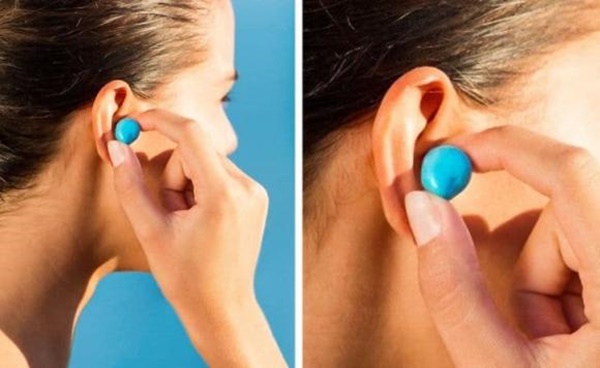
According to Congly & Xa hoi
The Ultimate Guide: Intimate Hygiene Tips Every Woman Should Know
Making mistakes when using intimate wash solutions and developing gynecological issues are common concerns for women, as these can not only impact their health but also lead to unpleasant odors and complications in their marital life. With our insightful guide on intimate hygiene, we aim to empower you to avoid these pitfalls and effectively safeguard your intimate area.
What Are the Benefits of Mandarin Orange Essential Oil? DIY Mandarin Orange Essential Oil to Eliminate Odors.
Essential oils derived from oranges are renowned for their versatility and potent properties. With a myriad of uses, from creating a soothing atmosphere through aromatherapy to its therapeutic benefits, orange essential oil is a true powerhouse. Join us as we delve into the fascinating process of extracting this precious oil from orange peels and uncover the myriad of ways it can enhance your life.
Is Shaving the Bikini Area Necessary for Expectant Mothers During Childbirth? What You Need to Know.
Pregnancy and childbirth are monumental moments in a woman’s life, and preparing for labor can be a daunting task. One question that often arises is whether expectant mothers should consider grooming their nether regions prior to delivery. In this introduction, we will delve into the benefits of bikini line hair removal during pregnancy and explore why it might be a worthwhile consideration for soon-to-be mothers.



























